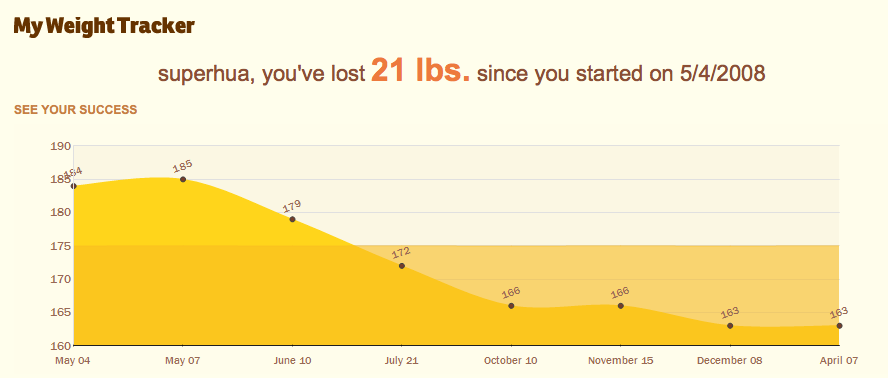
Last May my doctor informed me that my cholesterol was a bit high and that I should lose 5-10 pounds. I’ve never really tried to lose weight and was actually excited that I could — with the imprimatur of my PCP and using cool tools like 50MillionPoundChallenge.com no less! — try my hand at losing weight.
I was already exercising regularly and not eating absurd amounts of junk food, so what else could I do?
I had come across this site a while before and decided to eschew carbs as a result. In short, I went from eating a sandwich for lunch to eating a hearty salad for lunch. This combined with a summer full of classes (read: eating little) and an short-term missions trip (read: eating even less) seemed to jump start fat-burning mechanisms in my body.
Currently my goal isn’t so much weight loss, but eating real food. I want to reprogram my mind and attitude toward food, if you will. Slowly but surely I see this happening: when I see a fastfood ad, I cringe rather than crave.
I’m excited that this summer we’ll be starting a garden and participating in a community-supported agriculture (CSA) farm. In addition, I can’t wait until it gets warm enough to grill outside.
Theologically, this has raised two interesting points:
- Food is incredibly important in culture and, as a result, the Scriptures. (Indeed, I wrote an entire paper on it tracing that motif through the divine drama!) But being faithful is more important — so I’m not going to be legalistic regarding this: if you serve me a cookie, I will probably eat it. (cf. 1 Corinthians 8 for a similar argument)
- Avoiding bread and the like is interesting given the importance of bread in the Christian faith: Christ is the Bread of Life and bread is one of the elements in communion.
Excurses: If carbs are in fact bad for you, and bread is such a strong motif in Scripture, does this discount the veracity of the Christian witness?
Two things can be said in response: First, I’m almost positive they had a much healthier diet then compared to Americans today. The relatively small amount of bread they ate probably had a much smaller impact than the voluminous carbs and junk food intake of our society. Second, Christ fully entered into our context so much that He used the existing metaphors of the day. Since bread was such a staple, He used that without giving a nutrition lesson. The use of wine in the Scripture would probably draw out simliar arguments: too much wine is bad for you, but wine still finds a place of prominence in Scripture.